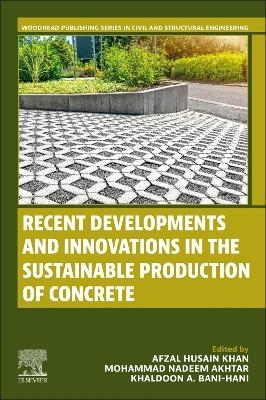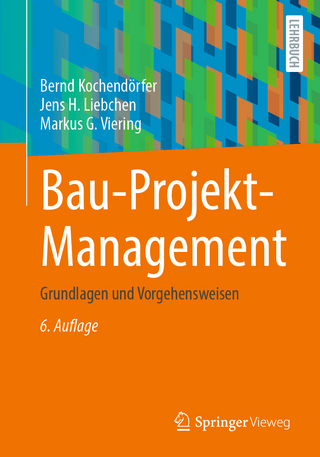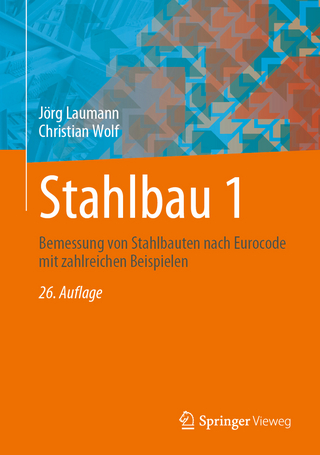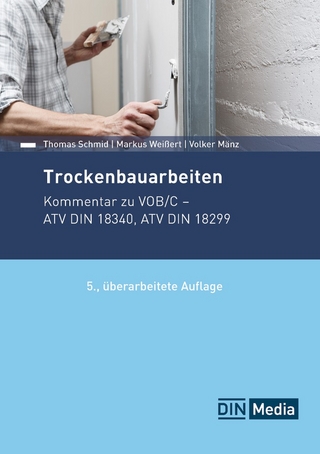
Recent Developments and Innovations in the Sustainable Production of Concrete
Woodhead Publishing (Verlag)
978-0-443-23895-6 (ISBN)
Dr. Afzal Husain Khan works in the Civil and Architectural Engineering Department at Jazan University, Saudi Arabia. He received his PhD from Universiti Sains Malaysia, Malaysia, and B.E. and M. Tech degrees from the Aligarh Muslim University, India. He is an academic editor of PLOS ONE, Advances in Civil Engineering (Wiley), Associate Editor in TEIEE, and Guest Editor in Elsevier/Springer/Frontiers journals. He has been involved in many funded projects under the Deanship of Scientific Research (DSR) in Saudi Arabia. He has 90+ peer-reviewed publications (h-index >30; >3000+ citations), 4 books (edited), 6 patents, and 5 book chapters to his credit. Dr Akhtar is based at the University of Malaya Kuala Lumpur, Malaysia. He is a reviewer for many journals: such as the KSCE Journal of Civil Engineering, Material Cycles, and Waste Management, and the International Journal of Pavement Research and Technology. His work on sustainable, self-compacting, and green concrete was published in the Journal of Materials Research and Technology (Elsevier), Construction and Building materials (Elsevier), and the Journal of Material Cycles and Waste Management (Springer Japan). Recently, he received the Best Researcher Award for the Academic Year 2021-22 from Fahad Bin Sultan University Tabuk, Saudi Arabia Professor Bani-Hani, based at the Jordan University of Science and Technology, is active in research in nanotechnology, material science, sustainability, energy harvesting, SHM, structural control, vibration; optimization; soft computing; and experimental methods.
Section A - Sources, materials, and waste products in concrete production 1. Valorization of industrial and agro-waste materials for production of green construction materials 2. A comprehensive study of concrete performance by using bacterial calcite precipitation 3. Self-compacting recycled aggregate concrete: future scope and challenges 4. Recent advances in microbiology in producing self-healing concrete 5 Geopolymer concrete: an innovative approach for sustainable infrastructure and advancement in circular economy 6. Ultrahigh-performance concrete: a new additive material in construction industry 7. Silica fume as sustainable supplementary cementitious materials in concrete 8. Cement replacement using pozzolanic materials: a sustainable approach 9. Mechanical and durability properties of bacteria-based admixed self-healing concrete under different exposures Section B - Economy, energy, and environment aspects in concrete production 10. Eco-efficient pavement construction materials 11. Crumb rubber as an eco-friendly aggregate in sustainable concrete: properties, integration, and future perspectives 12. Sustainability measurement of developed concrete by incorporating solid waste 13. Economic feasibility of a large-scale adoption of silica fume in construction 14. Circular economy in the construction sector: current trends and future outlook 15. Use of stabilized waste soil in the construction of sustainable concrete 16. Recycled aggregate concrete: a sustainable approach to concrete production 17. Circular economy in the construction sector in relation to brownfield redevelopment of a mining site: a case study of a mine in Ebonyi State, Nigeria 18. An experimental approach toward sustainable and eco-friendly sandcrete block using sawdust as a partial replacement for cement 19. Paving the future: breakthroughs in sustainable approaches to pavement 20. Strength behavior of ferrocement panel under the two-point loading system: a case study 21. Case studies of successful circular economy initiatives in the construction sector Section C - Machine learning approach in concrete construction 22. Machine learning in concrete construction: applications, challenges, and future aspects 23. Digital fabrication processes for cementitious materials using three-dimensional printing technologies 24. Internet of things in sustainable concrete production 25. Advancements in optimizing the quality assurance and crack detection by leveraging the application of emerging artificial intelligence (AI) trends for enrichment of civil infrastructure—a recapitulation
| Erscheinungsdatum | 30.11.2024 |
|---|---|
| Reihe/Serie | Woodhead Publishing Series in Civil and Structural Engineering |
| Sprache | englisch |
| Maße | 152 x 229 mm |
| Gewicht | 1000 g |
| Themenwelt | Technik ► Bauwesen |
| Technik ► Maschinenbau | |
| ISBN-10 | 0-443-23895-2 / 0443238952 |
| ISBN-13 | 978-0-443-23895-6 / 9780443238956 |
| Zustand | Neuware |
| Haben Sie eine Frage zum Produkt? |
aus dem Bereich


